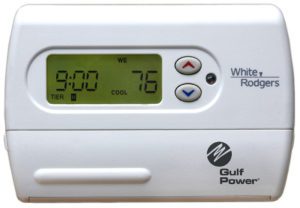Consejos energéticos para vencer las elevadas temperaturas
Las temperaturas de verano que se acoplarán con los índices de calor pueden superar los 100 grados. Eso hace que las personas pongan en marcha sus sistemas de refrigeración para combatir el calor y busquen formas de ahorrar en sus facturas de energía.
“Hay algunas acciones simples que los clientes pueden tomar hoy para minimizar el impacto en sus facturas de energía. Debido a que casi la mitad del consumo de energía en su hogar proviene de la calefacción y la refrigeración, ajustar el termostato lo más cómodo posible ayudará a los clientes a ahorrar dinero,” dijo Gordon Paulus, portavoz de Gulf Power.
A medida que se acerca el verano, típicamente una de las temporadas de mayor consumo de energía, Gulf Power quiere recordar a los clientes cuatro consejos gratuitos que se pueden usar para reducir el uso de energía y suavizar las facturas de energía:
- Mantenga alejado el calor: cierre sus persianas y cortinas durante el día para evitar el aumento de calor.
- Ajuste el termostato: cuanto menor sea la diferencia entre las temperaturas interiores y exteriores, menor será su factura de refrigeración general. La recomendación estándar de la industria de la energía es configurar su termostato a 78 grados o la temperatura más alta donde todavía puede estar cómodo. Por cada grado inferior a 78 grados, utilizará entre un 5 y un 10 por ciento más de energía para enfriar su hogar.
- Un ventilador de ventiladores: los ventiladores de techo ofrecen una alternativa económica para ajustar el termostato a una temperatura más baja porque los ventiladores lo hacen sentir más frío varios grados sin bajar la temperatura de la habitación, todo al mismo tiempo que usan una fracción de la energía consumida por el aire acondicionado. . Ajuste el ventilador para que gire en sentido contrario a las agujas del reloj en verano y asegúrese de apagarlo cuando salga de la habitación.
- Reduzca la producción de calor: evite usar el horno durante el verano y, en cambio, cocine a la parrilla, use el horno de microondas o la estufa o prepare comidas que no requieran cocción. Reemplace las bombillas incandescentes que producen calor con una iluminación más fría y eficiente. De hecho, los LED duran aproximadamente 10 veces más y producen cuatro veces más luz que las bombillas incandescentes estándar por la misma cantidad de energía
Energy tips to beat soaring temperatures
 Summer-like temperatures that will be coupled with heat indices can exceed 100 degrees. That has people cranking up their cooling systems to beat the heat and looking for ways to save on their energy bills.
Summer-like temperatures that will be coupled with heat indices can exceed 100 degrees. That has people cranking up their cooling systems to beat the heat and looking for ways to save on their energy bills.
“There are some simple actions customers can take today to minimize the impact on their energy bills. Because almost half of the energy usage in your home is from heating and cooling, adjusting the thermostat as high as comfortably possible will help customers save money,” said Gordon Paulus, Gulf Power spokesperson.
As summer approaches, typically one of the peak energy usage seasons, Gulf Power wants to remind customers of four free tips that can be used to reduce energy usage and smooth out energy bills:
- Keep heat out: Close your blinds and drapes during the day to prevent heat gain.
- Adjust thermostat: The smaller the difference between the indoor and outdoor temperatures, the lower your overall cooling bill will be. The standard energy industry recommendation is to set your thermostat to 78 degrees or the highest temperature where you can still be comfortable. For every degree below 78 degrees, you’ll use 5-10 percent more energy to cool your home.
- A fan of fans: Ceiling fans offer an inexpensive alternative to setting the thermostat to a lower temperature because fans make you feel several degrees cooler without lowering the temperature in the room — all while using a fraction of the energy consumed by the A/C. Set the fan to turn counter-clockwise in the summer and be sure to turn it off when leaving the room.
- Reduce heat production: Avoid using the oven during the summer and, instead, cook on the grill, use the microwave or stove top, or prepare meals that don’t require cooking. Replace heat-producing incandescent light bulbs with cooler and energy-efficient lighting. In fact, LEDs last about 10 times longer and produce four times more light than standard incandescent bulbs for the same amount of energy

















